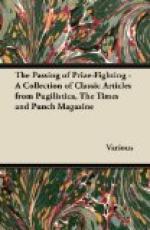* * * * *
More than once before this I have enjoyed the dexterity of Miss VIOLET HUNT in a certain type of social satire; but I regret to say that the expectation with which I opened The Last Ditch (STANLEY PAUL) was doomed to some disappointment. The idea was promising enough—a study of our British best people confronting the ordeal of world-war; but somehow it failed to capture me. For one reason it is told in a series of letters—a dangerous method at any time. As usual, these are far too long and literary to be genuine; though they keep up a rather irritating pretence of reality by repetitions of the same events in correspondence from different writers. Moreover, letters whose concern is the progress of recruiting or the novelty of war can hardly at this time avoid an effect of having been delayed in the post. But all this would have mattered little if Miss HUNT had chosen her aristocrats from persons in whom it was possible to take more interest. But the plain fact is that you never met so tedious a set. They are not witty; they are not even wicked to any significant extent. They simply produce (at least in my case) no effect whatever. Perhaps this may all be of intention; the author may have meant to harrow us with the spectacle of our old nobility expiring as nonentities. But in that case the picture is manifestly unfair. And it is certainly dull—dull as the last ditch-water.
* * * * *
In America in France (MURRAY) Lieut. Col. FREDERICK PALMER, a member of the Staff Corps of the United States Army, sets out to tell the story of the making of an army. This is the first book by Colonel PALMER that has come my way, but I find that he has written four others, all of which I judge by their titles to be concerned with the War. Be that as it may, I welcome America in France both because it gives a narrative of America’s tremendous effort, and because the book is written with a modesty which is very pleasing. America came to the job of fighting as a learner. Her soldiers did not boast of what they were going to do, but sat down solidly to learn, in order that she might be useful in the fighting-line. How she achieved




